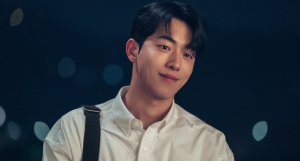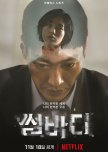
Korean cinema and thriller were born to be together
The first Korean work of television I have encountered that I can call a work of art. Now this is not the same as My Mister or Mr. Sunshine which are highest quality television. But Somebody felt like watching a class Korean film over eight episodes with a shot selection, attention to character expressions, and subtle dialogue and hidden motives that makes me think of Hamlet, the Mona Lisa, and American Psycho (which I didn't even know this adapted until looking it up). As well as the strongest use of score on the following terms: the greatest use of classical music for socio/psychopaths' trope, dual leitmotif for the two leads, interspersed pop, and the show's own soundtrack which is just so good, that I have seen in Korean television. Modern social communication ft. dating apps, a shaman, a serial killer, an AI chatbot, and love. The only word I can properly use to describe Somebody is insane, and I'm glad that Netflix suggested it to me because this was so up my dark alley.Shows like these make me excited for the future of Korean television, which in my opinion, is still nascent and only started showing its potential in the 2010s. The last time I tried to pull an all-nighter for a short series was Babylon 2-3 years ago (anime series about someone who makes people commit suicide). Somebody's sick at times but I just could not stop.
Esta resenha foi útil para você?
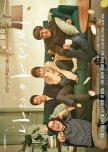
important to me
This review is highly personal, but to the effect of how personal My Mister was to its two leads, and to the characters surrounding them, I can only extend the same.There are so many things I want to say about 나의 아저씨. I want to say thank you to the writers for believing in the resilience to find what makes one happy and not walk along streets without sighing every few steps what makes us wake up each morning to get into our clothes. What makes us smile and say thank you and think we are good.
When I was in my freshman year of college, my first semester, I was in the lowest place. What got me out wasn't people. It wasn't my family, the few real friends I had, or even the faint dream I had been conjuring, which is now my foremost motivator. It was anime. It was the illusory friendships and the strength of "nakama" found in a silly adventure starting from a barrel. But what it really was, and what I've realized steadily with the kinds of shows and stories I draw to, is a semblance of the real, human closeness that to this day I hesitate to extend to my siblings, much less my friends. I realized that first year that I couldn't open up to others which remains key to my identity, which in the past few years I expressed more in writing or other artistic works I would share with others.
In this sense I related most strongly with Park Dong-hoon, although I am not well into any career nor married, I don't really talk to people when I have problems. I hold it in, and try to resolve it on my own. Occasional stories empower me such as this one, and the most significant preceding, Lucifer. Stories tell relationships and conversations between old friends. 나의 아저씨 is a "Korean drama" then in the truest sense of the word. I have not seen a work on the screen, while still young to it, as close to common and familial Korean manners of interaction, from the many Koreans I interacted with during my childhood and through today. 나의 아저씨 is not your standard "K-drama" although it is intensely emotional, incredibly emotional, one of the most emotionally powerful works of television I have seen ever since I started watching these pretenses. I don't think I've seen my eyes as red as they were, looking at myself in the mirror, after the last episode. That of course is a personal sharing and many K-dramas are emotional, that is what they are known to be. But this is different. How do these three people act as if they've known each other for over forty years as brothers? It's not too easy to describe their mannerisms well but as a Korean who grew up with a Korean brother, while these three were in their forties, I saw it. I saw it when their mother, a halmoni, reprimanded them and made their box lunches; my mother did the same for my education all until college. The screenplay more broadly was, especially for the drama, impactful, realistic in the manner of Korean speech, heartfelt, memorable, and grounded. There were many moments throughout where, sensitized as I have been to the tropes of storytelling, I had certain expectations, and they were simply ignored for a more realistic or compelling to-character decision and event. I am almost surprised that the land of Korean drama has works such as these, from my limited exposure, and particularly for why I even watched this one in the first place - IU, or her real name, Lee Ji-eun, my favorite artist.
I sampled some of the first episode of Hotel Del Luna and didn't much like what I saw of IU's character there. I started 나의 아저씨 and pretty quickly saw that Lee Ji-eun is, well, a pretty good actress, way better than I expected, perhaps I bent too much into her singing voice than her acting voice. While of course this was not watching a part of Lee Ji-eun's life, but a character she portrayed, some aspects are shared, such as her childhood being raised by her grandmother. I thus felt not only watching the character of Lee Ji-an, but also a part of Lee Ji-eun, whom I only knew as IU; I feel like she put a great part of herself into her performance. Having listened to her discography in release order prior to 나의 아저씨 and reading about her career, I saw some of what she put of herself in her music, in 나의 아저씨. An artist-to-person experience that I feel honored to have watched. One could say that this entire series is about waiting for IU to smile; and while certainly that is the case, there are many other things. Lee Ji-an is closed off to others for parts of her past, and doesn't trust others; doesn't think she's necessarily a "good person." Park Dong-hoon isn't happy as a general manager at a large corporation, and doesn't tell his family and friends what he's feeling. It is when these two meet, amidst the political machinations of the corporation, that spring a subtle, particular, special, under-explored relationship. The word "ajeossi" (아저씨) is not quite "mister" as it's used in America; it's not even the way the girl sees the older man in Goblin, which plays for a potential romance between the two, which is not the case here; or the anime After the Rain. While as with the Goblin who plays a "guardian" role, here the two grow to simply need each other in their lives. Do I have someone in my life that keeps me strong? and when I couldn't really think of anybody, I cried. Another way to put 나의 아저씨 is that of two depressed, miserable people who comfort each other in their shared pity. More broadly, "My Mister" is about being happy; and about how you can learn how, from those who keep you strong, those who tell you, "fighting," those who know you, really know you, so that no matter what you do, they don't care. The extent to which you see the characters on 나의 아저씨 be unhappy about their lives is significant; pretty much everyone hates themselves. But they keep living. A group of friends from a town who live together for forty years, is still living there, and they're OK.
행복하자. Let's be happy. It's not an easy thing to do but I hope you find someone who can encourage you to get there. I hope I do.
Esta resenha foi útil para você?

so hilarious and a ship of titanic proportions
As I listen to the English ver. of "Adrenaline" I am reminded of the two, no, three main threads of this show. I went in pretty much blind (which I usually do anyway), but, it is a K-drama, so a certain cherished element was proposed, strengthened, and finalized to a dual satisfaction and void. Now - it is done, and just like with My Mister (with its rewatch almost complete) and Twenty-Five Twenty-One, there is quite simply, no more episodes left (crying like Mr. Nam under the table), and my time with this iconic duo of a cold, brutal Mafia corn salad and a hotshot lawyer with an attitude is at an end... The other two threads are the fact that this show for the majority of its run is a comedy/heist/overture in performance theater shenanigans. I'm not sure if both Hamlet and Hector would be proud, or neither, as the two brothers would be - for this show is replete, schlock full of Hectors, a cast that with its communal and gag-driven tenacity reminds me most nearly of the town cast of Gintama. Most, if not all, of the cast besides Vincenzo has a primarily comedic role (in terms of how they were enjoyed on-screen). The third wave is action, and because Vincenzo not only knows how to completely manipulate his opponents, the corrupt bureaucracy of the Korean justice system, but also dominates the hand-to-hand combat scene. As such I'd pit Vincenzo's time in Korea with three genres, two main genres, for only the third really kept me going personally. But I still much enjoyed most of the gimmicks - the Vincenzo fanboy's jumping into the hallway and into Vincenzo's arms, "hwaitak", all of Vincenzo's own acts. The action would only have been better had Hockey Boy, Chief Hector, been good at fighting/doing anything himself. The Chairman Hector is probably my favorite character after Hong Cha-young, who I fell in love with in watching her with Vincenzo. I think what this series does most prominently, in bringing together two genres that really shouldn't go together - the kind of humor you see in Korean C-tier movies, but elevated to the television form, and Mafia political action thriller - is doing just that, bringing an Italian consigliere to the Korean lawyer scene where the first courtroom drama is theater and Italian music perpetuates the first episode and Italian comes out of the perfect mouth of Vincenzo Cassano. Going as far as they did against Babel to the very end was fantastic, and the constant emphasis by Vincenzo himself that he is not a good guy but someone with a Mafia background bringing his own evil against a big law firm and a big corporation. This sort of premise can only be done in Korea - with its own brand of humor, utilizing the influences from Italian Mafia tropes in the West, honor system, and their #1 skill, human relationships. It continues to appear to me that K-drama can't go wrong here, and I look forward to kicking my suit jacket back and heading on to the next one.Esta resenha foi útil para você?

inspiring but romantically unsatisfying
OK. Here goes. Start.First, I really liked Park Saeroyi. But even I should have realized that he would have gone way beyond expectation and just do what Park Saeroyi does. There are K-drama romances, and there are K-drama flannigans. This is one of them. Besides a perfect first episode, and an otherwise rocky start, it jumbles and tumbles like Dumbo but on solid footing. Because Park Saeroyi is first shown after seven years, smiling at Oh Soo-ah, wearing his heavy boots and he is almost never shown in different shoes after. The soundtrack was particularly good, K-dramas considered, and the insert songs were beautiful. More than just one I keep listening to after. Start, Still Fighting It (I hope they play it again after episode 14), Someday the Boy, and two others I think, I will have to find.
Yes, while I could finish, I dropped with two episodes remaining. I think watching this show, esp. after the food wars segment, gave me a motivation to make a decision about my life. I have a dream, but it's time to think about what I really want. Why I want it, and then, to think about how to shape my life going forward. I think this was a show that tried to do more than its 16-episode run allowed, but that's OK. I'll just pat it on the head and move on. I'll talk about how this show, until the romance didn't go the way I wanted, hit me.
So again, back to Park Saeroyi. You have inspiring characters, you have stalwart, unchanging characters, and you have good. Truly good - characters. In this, they put together all three. I may have the capacity for being truly good, and sometimes show it, but I need to be good every day. I need to be better, and be so good that even I don't doubt it (although I think that true good thinks it never attains the bar). I have a dream, and for the longest time I thought I wanted it for one reason. But I'm starting to realize what the act of writing really means to me, and that it's OK - perhaps better - to withstand the slings of arrows and outrageous fortune, and keep fighting it. Set a goal for further down the line. And aim even higher. I don't want to watch Breaking Bad for ambition, but Itaewon Class was about business ambition raised around people, the people around us we can't do it with. And maybe there's love too, and while K-dramas tend to "try romance" as a default (unless the premise distinctly forbids it), I saw something hopeful, something proud, in Park Saeroyi's ambition which was driven by revenge. In a way, his story resembles Edmond Dantès, where even he realized how he felt, and how he could go this way. I hesitate to apply this to my own life - this third part - because it's so much more delicate, and I need to get my life together first, before I can truly deserve that, rather than get my life together for someone else. I think in this way Oh Soo-ah, as she was to Saeroyi, is truly inspiring.
Other than Park Saeroyi's Tanjiro-levels fortitude, my favorite scenes were those with Ma Hyun-yi. Complete acceptance. Really lovely to see from a country that's somewhat trailing behind in that department, and I think like many other parts of this drama, a warm nod to the hope and strength and family we can bring to others. Itaewon Class is a powerful show, and while I'm not sure if I'm going to see the last two episodes, because I can talk about the two waylaid sons, the domineering chairman; Toni, who heightens the inclusiveness even further, or the former gang henchman who became a failed comedic support, the former bullied kid who slams at hedge funding, or the epic Kang Min-jung. There are tighter shows. There are "better" shows. But I think this one, more than Twenty-Five Twenty-One's Na Hee-do and My Mister, will make me at least think about the proper steps going forward. What do I really want to do with my life, who do I want to spend it with, and the kind of person I want to be. Thank you Park Saeroyi for showing me.
Esta resenha foi útil para você?
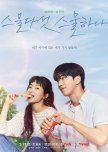
heart and inspiration
“The things I have can’t be lost. Such as my dream, and my aspiration.”Na Hee-do says, as she throws the flower to the sky and walks past something that the adults can worry about. Little does she know, that she will walk us through sixteen episodes and five years of growth, friendships, pursuing her dream, love, and memories of her unblemished transition from child to adult. I went into Twenty-Five Twenty-One practically blind, and did not expect them to take Hee-do and Yi-jin through so much of these photographed and diaried moments that, as adult Hee-do says, are brief but are what makes a long life shine. Last October I experienced My Mister, the only other work of television that has rent my heart in two full quaking pieces, and one that also highlighted the strength and purity of relationship that two people facing uncertain points in their lives could bring to one another. I had seen many Korean movies, so was very well familiar with how Korean screen work elevates human emotion, but more importantly, how with the nation’s cultural backdrop places an emphasis on the past, and remembering the sad events that have contributed to their present backbone. What I was not prepared for was first, unlike most of those movies, and second, unlike all of the previous Korean dramas I had seen and sampled, how realistic it handled the characters’ circumstances, interactions, and emotional moments. It seems to me, as it likely does by now to many others, that Korea manages to get at our emotional cores more fitfully, perfectly, than anyone else; and so My Mister not only brought me weeping for its characters’ sadnesses, but in its journey uplifted them, and through them, myself as the viewer who could only bear witness. As with My Mister, I came in a fan already of one of the main leads (IU), here with Kim Tae-ri. She is—to put it in as true a way as possible—breathtaking. The first few episodes alone were me trying to get over the fact that at age 31, she had played an 18-year-old, but as I couldn’t stop watching her smile so purely, laugh with her youth, and upend drinking fountains I fell completely into her character and as Hee-do grew older, I was only watching Hee-do, and sixteen episodes later, I am not watching Hee-do anymore. Her roles in Little Forest and The Handmaiden well displayed the lightness of the persona she brought to the scene. Imagine that but as light itself has a source, that source is Twenty-Five Twenty-One. While I have yet to see her completely in Mr. Sunshine, I have no doubt that just as Leonardo DiCaprio perhaps found his crystallization in The Wolf of Wall Street, Kim Tae-ri has done so here, in portraying a character in the best and sweetest spirit that she can be. Even if you have no idea who she is, that doesn’t matter; for like Baek Yi-jin, you too will be inspired, and find resolution to keep walking forward, in merely watching her. Having seen my good share of Japan’s shounen protagonists, who equip us with amazing dreams and work towards them in motivational (but hard to follow) arcs, as again the present day Hee-do says, progress takes place in steps, and witnessing Na Hee-do keep at attaque. touche. point. or without, because she loves fencing, and never gives up, gives me motivation like I have never felt before. Just as Baek Yi-jin tells Hee-do, in her presence he can stand on top of the world, he can do anything, after a number of episodes and during, I said aloud or thought to myself, I feel like I can do anything. I had been somebody who, for the past six years, have sought out in fiction those stories that I not only adore, but that can keep me going as stories, which has often been a tenuous mountain. For they are only stories, and when watching or reading these characters whom I love, I am not really living in the real world. I can go to bed at night thinking about how the episode or chapter ended, and have to wake up the next day facing real problems of my own. And I am going to have to do that tomorrow, besides which carrying a heart both empty and boundlessly inspired after Na Hee-do and Baek Yi-jin’s moments. But I feel like—for the first time, truly—I can do that for real. This Korean drama is transcendent. Not only did it take me through, unlike My Mister, five years practically in full, but even beyond its presiding song of love, the purest kind there is, in all its ways—but its most important theme, that of cherishing, remembering, and coming to where you are today because of moments in the past. These moments don’t go on forever. But they did happen, and you can cherish them in the moment, remember them later, and continue to live. Continue to love.
Now I have just the rest of my life ahead of me—and I feel like I can do it.
Esta resenha foi útil para você?

(review of both seasons) A testament to what brings us to live
Prior to binging this in two days, had already heard the main theme by Yutaka Yamada via YouTube uploader Em-Ost II, over a year ago - thought it was nice, but didn't think much of this "Alice in Borderland." Looked like a zombie show, and am not the biggest fan of the genre. Most of two seasons in, I realize that with the zombie genre, the death game genre has a pitfall - that the core human elements become restricted by nature, and certain types of questions, certain monologues, become expected. I even got spoiled on what this all really was by the current top comment to the manga on mangasee123 very early on, and followed along in the manga for the last few chapters/episodes. As I re-listen to my favorite track, "THE LOOKING GLASS" (which is even more fitting, being the name of Lewis Carroll's sequel), which only plays during the interrogation of life, and why we live it, I think of what a journey this was. For the majority of these sixteen episodes, which I saw on Netflix through my brother's account over two days, I ranted inside my head how I'd start this review: that this is probably one of the worst TV series I've ever seen. A lot of it was deathly boring, I'm not used to the way Japanese people talk in live action, it's very different from anime - there's this lilt to it - a lot of the characters seem one-note, although Chishiya my absolute favorite was always a delight - having seen Squid Game and Deadman Wonderland, Mirai Nikki and read I Am a Hero, and the epic Gantz twice, to name some others - this seemed to pall in comparison. Given its title and clear rewrite, this work becomes less another installment in this grisly subgenre which leaves little to the imagination, and more a work of... the human act, and I highly recommend reading along in the manga for the last few chapters, or at minimum reading Ch. 65 after episode 16, for while you don't have to have read the original (Alice in Wonderland), I'd only seen the Disney and that one Jack Sparrow adaptation, the "ending" to this series might be apparent from the beginning - but you keep watching, and while I was so bored and dismayed at times, the second season ramped it up, and some of the games were actually exciting. It's strange listening to Yutaka Yamada after experiencing his work in Tokyo Ghoul, Great Pretender, Babylon, and Vinland Saga (for a live action), but he delivers when needed as always and at times, I thought too good for the show; I also thought the acting by some of the cast was extremely forced, but all in all there are moments that are truly beautiful, which is why I'm looping the abovementioned track to get in the review vibes. This is my first Japanese live action series, and I would not necessarily recommend the manga, as while it has some additional details, for experiencing the death matches and characters' emotions, still black and white can't do it justice. I seriously considered dropping this series after season 1, and almost wrote a review then; but, depressed as I was anyway, I continued. I read on MAL from a review of the manga that this is best for either fans of the genre or those who are struggling to get through life; and of the examples stated above, this honestly might do it the best, not in terms of the game mechanics or the excitement but in terms of what Arisu goes through to learn the meaning of these games. Ultimately you're just watching this for entertainment, maybe some of you like me to derive some meaning from it, attempt to wrest it into your personal life and how you act the next morning as it's past 4am. My eyes hurt and I'm tired... but I'll keep on going. Life the way I live it, by constantly thinking of what to do next, may come down to more than two choices but I must always keep in mind who I am. Because I am alive.If Everything Everywhere All at Once shows the power of fictional metaphor through audiovisual storytelling, then Alice in Borderland shows the power of storytelling itself. That we will continue to tell ourselves stories to make sense of the world we live in.
Esta resenha foi útil para você?

Intense
I saw this ranked #1 of all K-dramas on Letterboxd for 2022, after finishing My Liberation Notes (ranked 2nd). Seeing the premise, I immediately thought of a violent, unstopping tirade of power against the weak, but what I saw was that and power against those who choose to oppress the weak. Right from episode 1 you see a kid get revenge on his tormentor in a fashion nearly John Wick style that a certain level of torture has to bring about - the question then is, how far can you go, and they just keep on going. Korea always deliversEsta resenha foi útil para você?
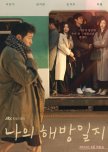
As close to tangible human drama as Korean television can get
Transcending the fabric of the “television series” and entering my reality, if only for those sixteen episodes. That is My Liberation Notes, a drama work that understands the heart of any drama—dialogue. A drama, at minimum, needs two people to slide their hearts off of each other and in the modern “K-drama” discourse, it’s often expected that the two leads will fall in love, and embrace to the ballad of a beautiful pop song. In the words of a friend, every relationship is different; and to take from Tolstoy, while every relationship is different, every happy relationship is the same. Because it’s hard to be happy in a world sublimated by texts, social media, bureaucracy, and the pangs of dispriz'd love. While many of us seem to be doing well, most of us aren’t; and so Park Hae-young takes us through a brief period within the lives of Yeom Gi-jeong, Yeom Chang-hee, and Yeom Mi-jeong.Park’s previous series, My Mister, was nothing short of a wonder and finishing it left me in a deep but empty void as I realized that I didn’t have someone whom I was willing to talk to, on a regular basis, about how hard living was. I’ve seen all but most of two episodes on the rewatch but have found it difficult to finish again. Four years later, Park brings this talk therapy to three people, or three “ones,” by placing them in a variety of sitting locations, episode after episode, simply—talking. About partway into the series I grew to miss Chang-hee’s ranting at life, at his co-worker, at not having a fancy car, at how he talks so much, and just listening. Gi-jeong I didn’t love a great amount, but she has her personality; and Mi-jeong, I will really miss—I do already—just listening. You really aren’t like many of us but watching you walk along the sidewalk at night, just talking, I heard a note. And that was the beginning of a song, a song that as we watch the birds fly above in the pink sky we hear them and see for ourselves that life is really just the same.
It's hard to be happy, and it’s really difficult to change; but life always brings moments of joy, and times when your heart thinks briefly of liberation.
Life is so hard, and that’s why I look at fiction’s great and immeasurable world for something better; for copium, essentially. I watch show after show, see movie after movie and find something to relate by as I return to my life and do I actually change? As a talking horse once said, you have to do it every day, and it’s really hard. But with these three working adult siblings who still live at home with their parents, after a time I didn’t think of it as fiction. I’m scared to look up the actors, although I will because I need more alternate universe Chang-hee and Mi-jeongs—it is a wonder to me how these real people can become others temporarily. With acting, you take on a personality and act, react, according to the situation but far more immersive, I think is how one lives out the other life, eats all those meals and drinks all those iced americanos. It’s a betrayal of that fictional curtain and almost feels tainted; that we have come to a point where fiction can feel so real and so grounded, to use a term conceived by a friend, whereby the movements and dialogue currencies of this work were just so natural, so organic that everything—and I mean everything—made sense. It’s not simple either. The series doesn’t even end on anywhere close to a satisfying “ending” because it’s not one. 16 episodes are the standard length for Korean television and so it ends there. If “change” is the primary language of fiction, how the several and many characters challenge it makes fiction its best. It’s even harder to do so in real life, but it didn’t even feel like Park did all he could to inhibit his characters from changing. He simply… wrote them as they were.
I can’t resist and have to quote one of the supporting characters at this moment:
“I once read a book to become a writer about how to be a good writer, and it said that a good drama is one where the main character tries hard to achieve something but can’t do it. So I gave up. Why would I write something that’s like life? It’s so boring.”
At its core, My Liberation Notes is about trying to be happy. Whether it comes from satisfaction with your career, finding love, or understanding your deepest issues. The best shows don’t motivate us to change. They tell us that the journey of life is hard, is harder like nothing else—but you really need to talk to those around you, and your heart just might ask every day what it means to live. You don’t have to answer it. But your heart moves all the same.
Esta resenha foi útil para você?

